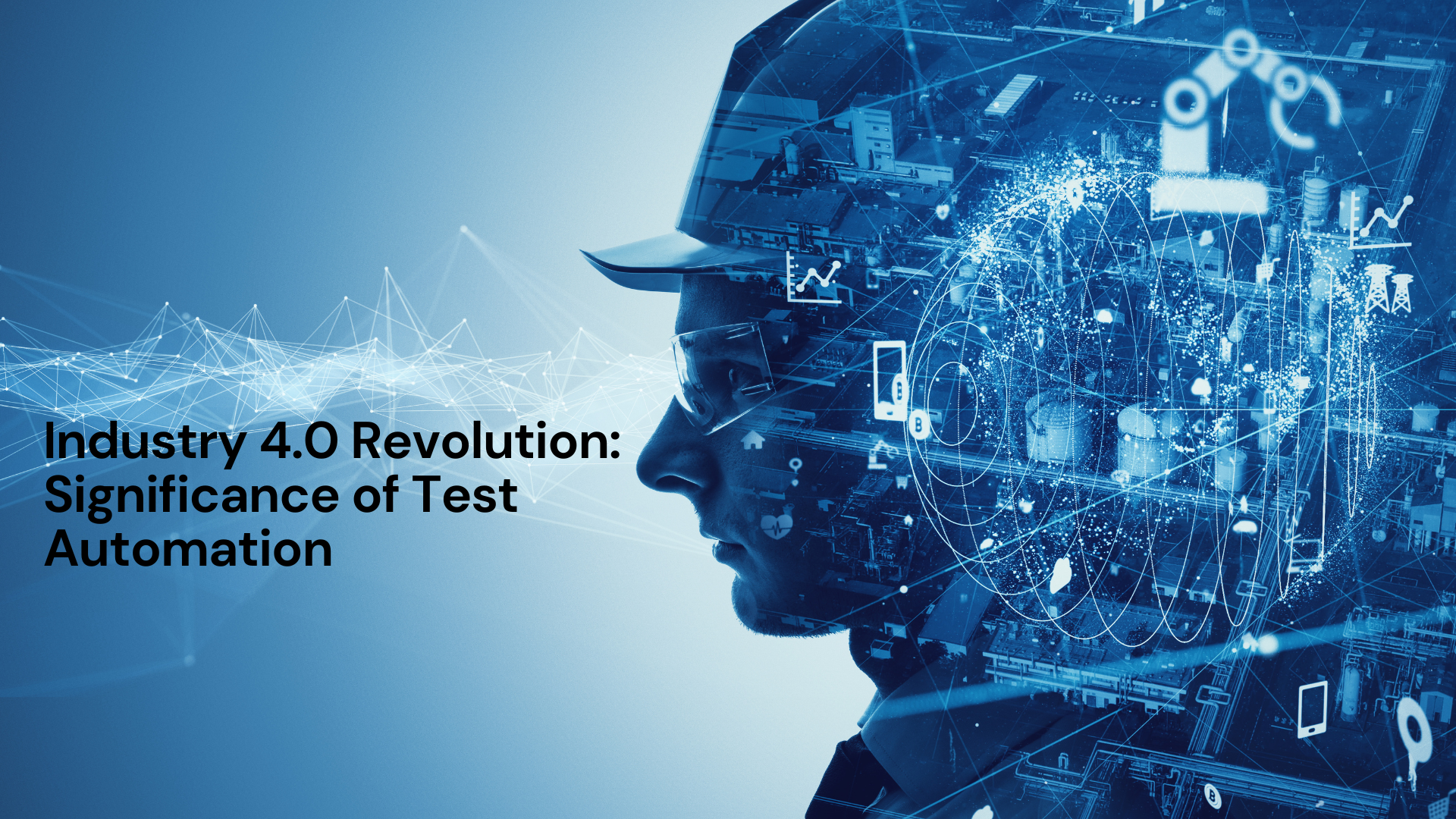Industry 4.0 Revolution: Significance of Test Automation
 Kavitha R
Kavitha R
The fourth industrial revolution or Industry 4.0 has accelerated rapid changes in technologies, processes, and operational patterns. It has transformed the way companies operate with advanced inclusion like smart technologies, advanced integration, agility, interoperability, real-time updates, continuous monitoring, increased productivity, and improved decision-making. The trend is predominantly being implemented by the software companies to stay at par with the competitors. To ensure faster application delivery, advanced testing tools and techniques should be considered to ensure quality.
The modern systems in industry 4.0 involve highly complex, interconnected systems that offer a seamless user experience. Testing these systems is a difficult affair which can be prone to errors when done manually, hence, advanced testing technologies like automation and AI, ML are required to get desired quality outcomes. Take a look at how testing techniques have modified in industry 4.0.
Testing in industry 4.0
Commonly, testing is important to ensure the quality of any application. A high-quality application will attract more users and keep the existing ones engaged. In the current scenario of industry 4.0 revolution with interconnected digital ecosystem, testing becomes critical to ensure the application interacts well in the ecosystem and its work well as individual entity as well as in the whole system. Testing evaluates the efficiency, scalability, and flexibility of an applications under the modern scenarios. It should be thoroughly tested, specifically for functionality and usability, to ensure they are working as expected. In the event of any glitch or failure, it will affect the entire system leading to frustrated users who might tend towards the competitors. Hence, it is critical to test the connected software ecosystem to offer seamless user experience, increase credibility, retain existing users, attract new users, and increase business revenue.
The industrial revolution trend has given rise to new testing approaches that will align with the advancing development technologies and yield expected results. Organizations are constantly upgrading existing versions or adapting new technologies, making it essential to test the system for any glitch while modernizing or upgrading. Hence, it becomes essential to embrace the next-gen testing solutions.
Software testing methods to dominate in the industry 4.0 trend
Creating applications faster and smarter in the agile and DevOps culture will dominate in Industry 4.0, allowing new testing solutions to make their way that will align with this new trend. There are a wide range of testing approaches that will be seen in the coming years, some of them have already made their presence and will advance with time.
Automated testing: Industry 4.0 is all about automation and smart integration. Though codeless automation is already implemented by most organizations, this will remain an integral part of the 4.0 revolution. In fact, the fourth industrial revolution is characterized by automated testing along with other advanced testing methodologies. Automation helps in improving operational effectiveness, enhancing product quality, and offering seamless user experience.
Web applications: Progressive web applications (PWA) are the future, they are the major trend of the industry 4.0. PWAs are slowly replacing the native apps and capturing a major share in the market. As the trend of PWAs are increasing, testing them becomes inevitable to ensure there are no glitches and they offer a seamless user experience. Web app testing is one of the methods that will continue to dominate in the 4th revolution trend.
Cloud testing: Industry 4.0 is all about being ‘fast’ and ‘smart’. Cloud-based testing simplifies and speeds up the process and provides access from anywhere, anytime. Here, testing is carried out using an emulator or simulator accessed over Cloud.
AI-integrated testing: AI is the next big thing in the industry, incorporating AI in testing will ease the complexity of Industry 4.0. AI-integrated testing mimics human behavior and yields greater benefits by increasing efficiency and accuracy, and reducing time, cost, and human errors.
Smart integrations: Smart Integration is an approach to build an ecosystem that combines functions of different technologies. Some of the smart integrations include Dropbox, Microsoft Office, etc., it is important to test if the integrations are seamless and don’t cause any discrepancy across the system.
IoT testing: IoT (internet of things) has emerged as a top trend in the domestic and industrial space. While domestic IoT interconnects home appliances, smart devices, wearable devices, and lot more, industrial IoT is a complex, interconnected ecosystem with software and network sensors. Testing of this complex system should be performed to check for its interoperability, scalability, performance, and network impact. All these components must be tested to ensure they yield expected results.
As the emphasize on interconnected systems is on the rise, IoT testing is increasing and predominately implemented by organizations dealing with the same. IoT is an important part of the industry 4.0 revolution which is further going to transform various industries.
Big data testing: Industry 4.0 is set on the big data vision that tries to achieve business intelligence by collecting, segregating, analyzing, and utilizing data. It deals with an enormous amount of data which should be mined to extract the required information. This whole process should be tested to evaluate the functionalities of big data applications, called big data testing. Big data testing is emerging with Industry 4.0 trend and will soon become a more common terminology.
Crowd testing: Testing in Industry 4.0 is a gigantic task requiring a huge workforce, which may not be sufficient with the numbers the industry is operating. Hence, crowd testing is going to dominate the 4.0 trend, where groups of temporary workforce are hired to get the job done quickly and efficiently.
Conclusion
Organizations have to continuously innovate in order to sustain the industry 4.0 revolution and emerge as a successful player. Innovation in terms of software testing is essential to align with the changing technological trends and help companies to improve software quality. As discussed, the 4.0 revolution is all about finding faster and smarter solutions; the software testing industry is also evolving to adapt to this trend. Quicker and intelligent testing solutions will help companies to reduce turnaround time and speed up the deployment and delivery process. The testing trends of 4.0 industry will be mostly automated and intelligence-driven for optimal results.
Subscribe to my newsletter
Read articles from Kavitha R directly inside your inbox. Subscribe to the newsletter, and don't miss out.
Written by

Kavitha R
Kavitha R
Test Automation Evangelist | Overcoming Software Testing Challenges | Tenjin Online | Codeless Test Automation